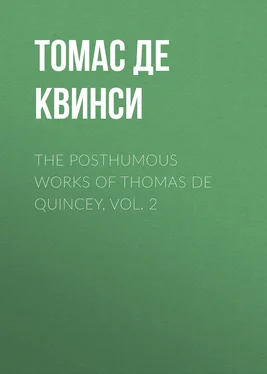Томас Де Квинси - The Posthumous Works of Thomas De Quincey, Vol. 2
Здесь есть возможность читать онлайн «Томас Де Квинси - The Posthumous Works of Thomas De Quincey, Vol. 2» — ознакомительный отрывок электронной книги совершенно бесплатно, а после прочтения отрывка купить полную версию. В некоторых случаях можно слушать аудио, скачать через торрент в формате fb2 и присутствует краткое содержание. Жанр: foreign_prose, literature_19, foreign_antique, на английском языке. Описание произведения, (предисловие) а так же отзывы посетителей доступны на портале библиотеки ЛибКат.
- Название:The Posthumous Works of Thomas De Quincey, Vol. 2
- Автор:
- Жанр:
- Год:неизвестен
- ISBN:нет данных
- Рейтинг книги:3 / 5. Голосов: 1
-
Избранное:Добавить в избранное
- Отзывы:
-
Ваша оценка:
- 60
- 1
- 2
- 3
- 4
- 5
The Posthumous Works of Thomas De Quincey, Vol. 2: краткое содержание, описание и аннотация
Предлагаем к чтению аннотацию, описание, краткое содержание или предисловие (зависит от того, что написал сам автор книги «The Posthumous Works of Thomas De Quincey, Vol. 2»). Если вы не нашли необходимую информацию о книге — напишите в комментариях, мы постараемся отыскать её.
The Posthumous Works of Thomas De Quincey, Vol. 2 — читать онлайн ознакомительный отрывок
Ниже представлен текст книги, разбитый по страницам. Система сохранения места последней прочитанной страницы, позволяет с удобством читать онлайн бесплатно книгу «The Posthumous Works of Thomas De Quincey, Vol. 2», без необходимости каждый раз заново искать на чём Вы остановились. Поставьте закладку, и сможете в любой момент перейти на страницу, на которой закончили чтение.
Интервал:
Закладка:
VII. ' The Defence of the English Peerage ' is printed because, although it does not pretend to much detail or research, it shows anew De Quincey's keen interest in the events of English history, and his vivid appreciation of the peerage as a means of quickening and reviving in the minds of the people the memorable events with which the earlier bearers of these ancient titles had been connected.
VIII. The ' Anti-Papal Movement ' may be taken to attest once more De Quincey's keen interest in all the topics of the day, political, social, and ecclesiastical.
IX. The section on literature more properly will be interesting to many as exhibiting some new points of contact with Wordsworth and Southey.
X. The articles on the ' Dispersion of the Jews ,' and on ' Christianity as the result of a Pre-established Harmony ,' will, we think, be found interesting by theologians as well as by readers generally, as attesting not only the keen interest of De Quincey in these and allied subjects, but also his penetration and keen grasp, and his faculty of felicitous illustration, by which ever and anon he lights up the driest subjects.
I. CONVERSATION AND S. T. COLERIDGE
Oh name of Coleridge, that hast mixed so much with the trepidations of our own agitated life, mixed with the beatings of our love, our gratitude, our trembling hope; name destined to move so much of reverential sympathy and so much of ennobling strife in the generations yet to come, of our England at home, of our other Englands on the St. Lawrence, on the Mississippi, on the Indus and Ganges, and on the pastoral solitudes of Austral climes!
What are the great leading vices of conversation as generally managed?—vices that are banished from the best society by the legislation of manners, not by any intellectual legislation, but in other forms of society, and exactly as it approaches to the character of vulgarism, disturbing all approaches to elegance in conversation, and disorganizing it as a thing capable of unity or of progress? These vices are, first, disputation; secondly, garrulity; thirdly, the spirit of interruption.
I. I lay it down as a rule, but still reserving their peculiar rights and exceptions to young Scotchmen for whom daily disputing is a sort of daily bread, that the man who disputes is a monster, and that he ought to be expelled from civilized society. Or could not a compromise be effected for disputatious people, by allowing a private disputing room in all hotels, as they have private rooms for smoking? I have heard of two Englishmen, gentlemanly persons, but having a constitutional furor for boxing, who quieted their fighting instincts in this way. It was not glory which they desired, but mutual punishment, given and taken with a hearty goodwill. Yet, as their feelings of refinement revolted from making themselves into a spectacle of partisanship for the public to bet on, they retired into a ball-room, and locked the doors, so that nothing could transpire of the campaigns within except from the desperate rallies and floorings which were heard, or from the bloody faces which were seen on their issuing. A limited admission, it was fancied, might have been allowed to select friends; but the courteous refusal of both parties was always 'No; the pounding was strictly confidential.' Now, pray, gentlemen disputers, could you not make your pounding 'strictly confidential'? My chief reasons for doing so I will mention:
1. That disputing is in bad tone; it is vulgar, and essentially the resource of uncultured people.
2. It argues want of intellectual power, or, in any case, want of intellectual development. It is because men find it easier to talk by disputing than by not disputing that so many people resort to this coarse expedient for calling the wind into the sails of conversation. To move along in the key of contradiction is the cheapest of all devices for purchasing a power that is not your own. You are then carried along by a towing-line attached to another vessel. There is no free power. Always your antagonist predetermines the course of your own movement; and you his. What he says, you unsay. He affirms, you deny. He knits, you unknit. Always you are servile to him ; and he to you . Yet even that system of motion in reverse of another motion, of mere antistrophe or dancing backward what the strophe had danced forward, is better after all, you say, than standing stock still. For instance, it might have been tedious enough to hear Mr. Cruger disputing every proposition that Burke advanced on the Bristol hustings; yet even that some people would prefer to Cruger's single observation, viz., 'I say ditto to Mr. Burke.' Every man to his taste: I, for one, should have preferred Mr. Cruger's ditto . 1 1 Really now I can't say that. No; I couldn't have stood Cruger's arguments. 'Ditto to Mr. Burke' is certainly not a very brilliant observation, but still it's supportable, whereas I must have found the pains of contradiction insupportable.
But why need we have a ditto , a simple affirmo , because we have not an eternal nego ? The proper spirit of conversation moves in the general key of assent, but still not therefore of mere iteration, but still each bar of the music is different. Nature surely does not repeat herself, yet neither does she maintain the eternal variety of her laughing beauty by constantly contradicting herself, and quite as little by monotonously repeating herself. Her samenesses are differences.
II. Of the evils of garrulity, which, like the ceaseless droppings of water, will eat into the toughest rock of patience and self-satisfaction, I have spoken at considerable length elsewhere. Its evils are so evident that they hardly call for further illustration. The garrulous man, paradoxical as it may seem to say it, is a kind of pickpocket without intending to steal anything—nay, rather he is fain to please you by placing something in your pocket—though too often it is like the egg of the cuckoo in the nest of another bird.
III. Now, as to Interruption , what's to be done? It is a question that I have often considered. For the evil is great, and the remedy occult. I look upon a man that interrupts another in conversation as a monster far less excusable than a cannibal; yet cannibals (though, comparatively with interrupters , valuable members of society) are rare, and, even where they are not rare, they don't practise as cannibals every day: it is but on sentimental occasions that the exhibition of cannibalism becomes general. But the monsters who interrupt men in the middle of a sentence are to be found everywhere; and they are always practising. Red-letter days or black-letter days, festival or fast, makes no difference to them . This enormous nuisance I feel the more, because it is one which I never retaliate. Interrupted in every sentence, I still practise the American Indian's politeness of never interrupting. What, absolutely never ? Is there no case in which I should? If a man's nose, or ear, as sometimes happens in high latitudes, were suddenly and visibly frost-bitten, so as instantly to require being rubbed with snow, I conceive it lawful to interrupt that man in the most pathetic sentence, or even to ruin a whole paragraph of his prose. You can never indeed give him back the rhetoric which you have undermined; that is true; but neither could he, in the alternative case, have given back to himself the nose which you have saved.
I contend also, against a great casuist in this matter, that had you been a friend of Æschylus, and distinctly observed that absurd old purblind eagle that mistook (or pretended to mistake) the great poet's bald head—that head which created the Prometheus and the Agamemnon—for a white tablet of rock, and had you interrupted the poet in his talk at the very moment when the bird was dropping a lobster on the sacred cranium, with the view of unshelling the lobster, but unaware that at the same time he was unshelling a great poet's brain, you would have been fully justified. An impertinence it would certainly have been to interrupt a sentence as undeniable in its Greek as any which that gentleman can be supposed to have turned out, but still the eagle's impertinence was greater. 2 2 This sublimest of all Greek poets did really die, as some biographers allege, by so extraordinary and, as one may say, so insulting a mistake on the part of an eagle.
That would have been your excuse. Æschylus, or my friend the casuist, is not to be listened to in his very learned arguments contra .
Интервал:
Закладка:
Похожие книги на «The Posthumous Works of Thomas De Quincey, Vol. 2»
Представляем Вашему вниманию похожие книги на «The Posthumous Works of Thomas De Quincey, Vol. 2» списком для выбора. Мы отобрали схожую по названию и смыслу литературу в надежде предоставить читателям больше вариантов отыскать новые, интересные, ещё непрочитанные произведения.
Обсуждение, отзывы о книге «The Posthumous Works of Thomas De Quincey, Vol. 2» и просто собственные мнения читателей. Оставьте ваши комментарии, напишите, что Вы думаете о произведении, его смысле или главных героях. Укажите что конкретно понравилось, а что нет, и почему Вы так считаете.











